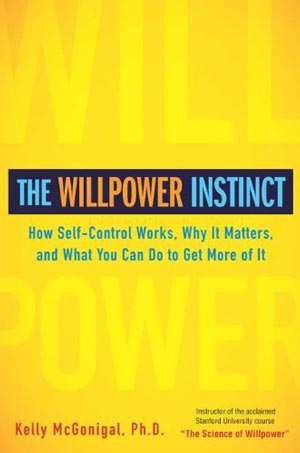Think of the book The Willpower Instinct by Kelly McGonigal as Willpower 2.0. In Willpower: Rediscovering the Greatest Human Strength we got the basics of willpower science. In the Willpower Instinct we get the action plan. The book is based on the popular continued education course McGonigal teaches at Stanford University. Each person who attends the class is given a basic assignment:
- Define your willpower challenge.
- Practice a strategy each week.
This is a book not to be read on the plane during vacation or on the couch over a long weekend. She wants you to read the book slowly, like you are taking the class. You too should define your willpower challenge as you read chapter one and practice a strategy with each chapter.
Willpower challenges, McGonigal says, fall into one of three buckets:
- I won’t (eat the cupcake, smoke a cigarette, buy another pair of shoes).
- I will (go to the gym, drink more water or finish my dissertation).
- I want (to save for retirement, start my own business or spend more time reading).
If I were taking this class, my willpower challenge would be an I WILL.
I will keep my office clean.
I hate cleaning more than just about anything in the world. And my office shows it. Since I am the only one who occupies it, I don’t feel a guilty about it’s disarray as I might the living room or kitchen. But I know it drives my husband crazy. Sometimes, when I lose my pen to a pile of papers or I can’t find a receipt, it drives me crazy too.
In week one (chapter one) we start with the basics: what is willpower and the neuroscience behind it. You are also asked, like the students in the class, to define your willpower challenge. Then you start to put the science of willpower into practice.
I asked myself the two questions presented at the end of chapter one regarding my own willpower challenge.
What makes it so hard to clean my office? I could say time or lack of cute organization tools. But if we’re really being honest I have to save that it feels overwhelming. It feels as though it is never done. So why start?
Are there two competing minds/selves? There is the self who loves it when the desk is clear and everything is in the right file. This the highly organized self that my clients get to see most of the time. Then there is the indulgent self. This is the self who wants to sit on the couch and watch Ellen on the DVR or curl up with a good book. This is the self who sometimes feels ignored by the rigors of running a business.
The first chapter also presents two willpower experiments. Your goal would be to try both, seeing which one worked for you and your particular challenge. I chose the assignment to meditate for five minutes a day because I am already working on taking regular mediation breaks. But how does this help? Meditation is focusing on a goal and training your brain to return to it when it strays. We know from research that when you strengthen willpower in one area it translates to others. Train your brain with mediation and you train it to stay with other goals and return back when you get off track. Plus stress depletes willpower reserve. By reducing stress, as meditation is proven to do, you can conserve your willpower for other critical tasks.
I would like to say my office is cleaner after chapter one, but it’s not. And that’s okay. Long-term solutions to any problem aren’t quick. I’ll be moving on to chapter two soon to see if what the next step to overcome my personal willpower challenge.
What is your willpower challenge? Have you read the book and found a strategy particularly helpful?



